Medical Education: Theories, Styles, Motivation and Practice
VerifiedAdded on 2023/01/13
|12
|3810
|59
Report
AI Summary
This report delves into the multifaceted realm of medical education, encompassing a thorough examination of various learning theories, including behaviorism, cognitivism, constructivism, connectivity, humanism, and andragogy. It explores the significance of educational theories in shaping effective medical knowledge acquisition and the crucial role of motivation in the learning process. The report also investigates diverse learning styles, such as visual, aural, verbal, physical, logical, social, and solitary, and their impact on knowledge retention and comprehension. Furthermore, it addresses key principles of adult learning, emphasizing the importance of effective feedback and awareness in fostering professional growth. The discussion highlights the application of these concepts in real-world scenarios, aiming to enhance the quality of care provided by healthcare professionals. The report underscores the ongoing nature of medical education, emphasizing the continuous need for healthcare professionals to update their knowledge and skills.
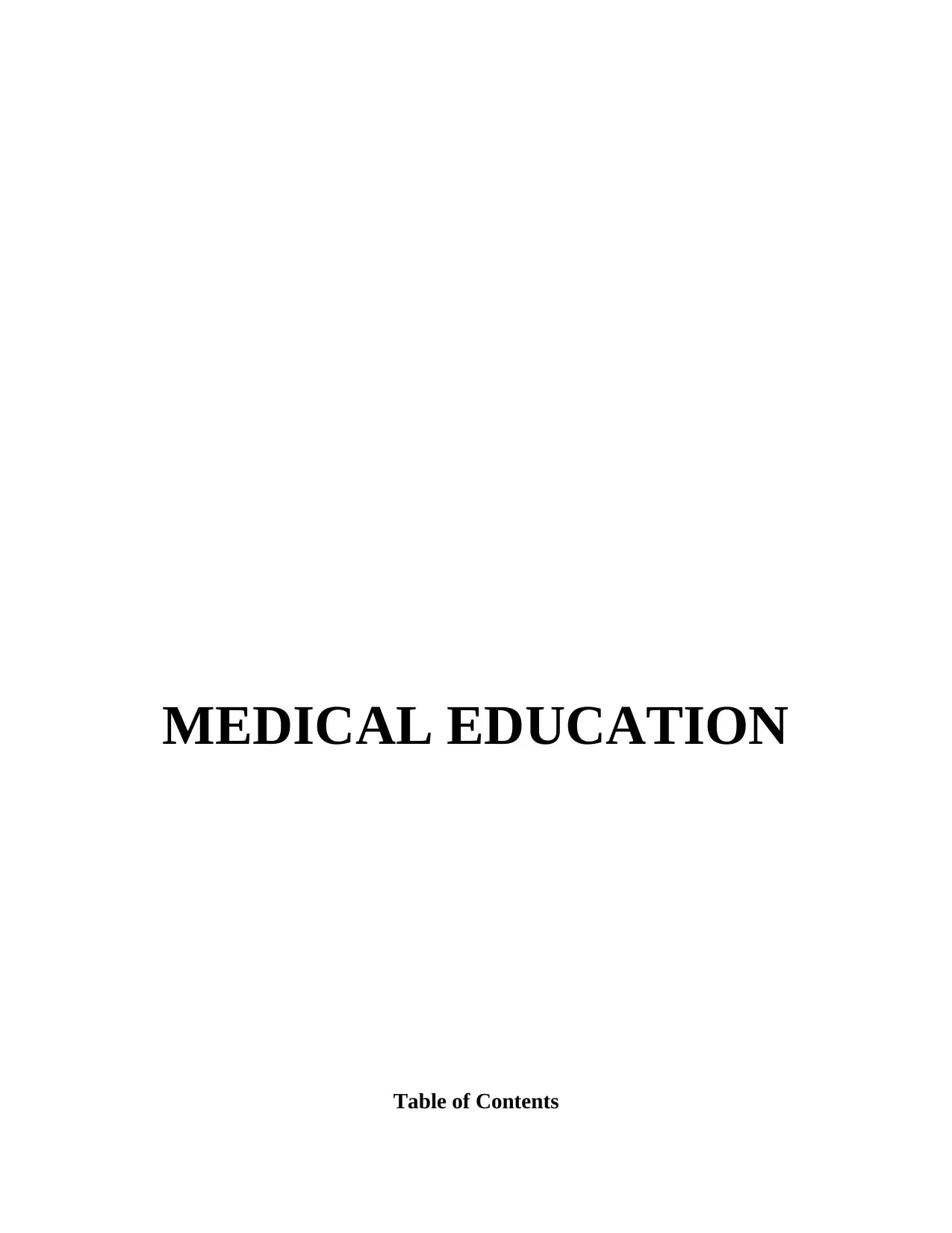
MEDICAL EDUCATION
Table of Contents
Table of Contents
Paraphrase This Document
Need a fresh take? Get an instant paraphrase of this document with our AI Paraphraser
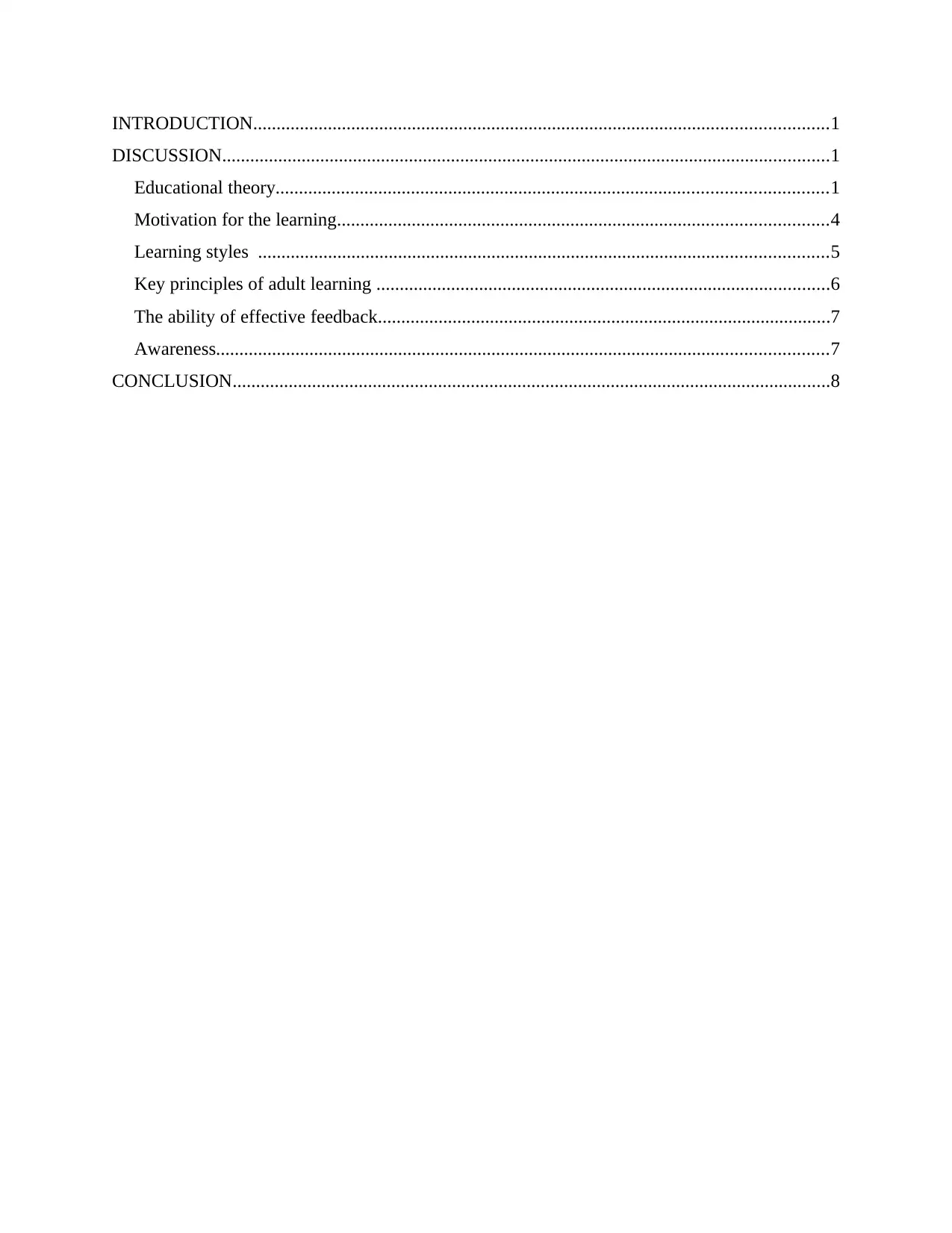
INTRODUCTION...........................................................................................................................1
DISCUSSION..................................................................................................................................1
Educational theory......................................................................................................................1
Motivation for the learning.........................................................................................................4
Learning styles ..........................................................................................................................5
Key principles of adult learning .................................................................................................6
The ability of effective feedback.................................................................................................7
Awareness...................................................................................................................................7
CONCLUSION................................................................................................................................8
DISCUSSION..................................................................................................................................1
Educational theory......................................................................................................................1
Motivation for the learning.........................................................................................................4
Learning styles ..........................................................................................................................5
Key principles of adult learning .................................................................................................6
The ability of effective feedback.................................................................................................7
Awareness...................................................................................................................................7
CONCLUSION................................................................................................................................8

⊘ This is a preview!⊘
Do you want full access?
Subscribe today to unlock all pages.

Trusted by 1+ million students worldwide
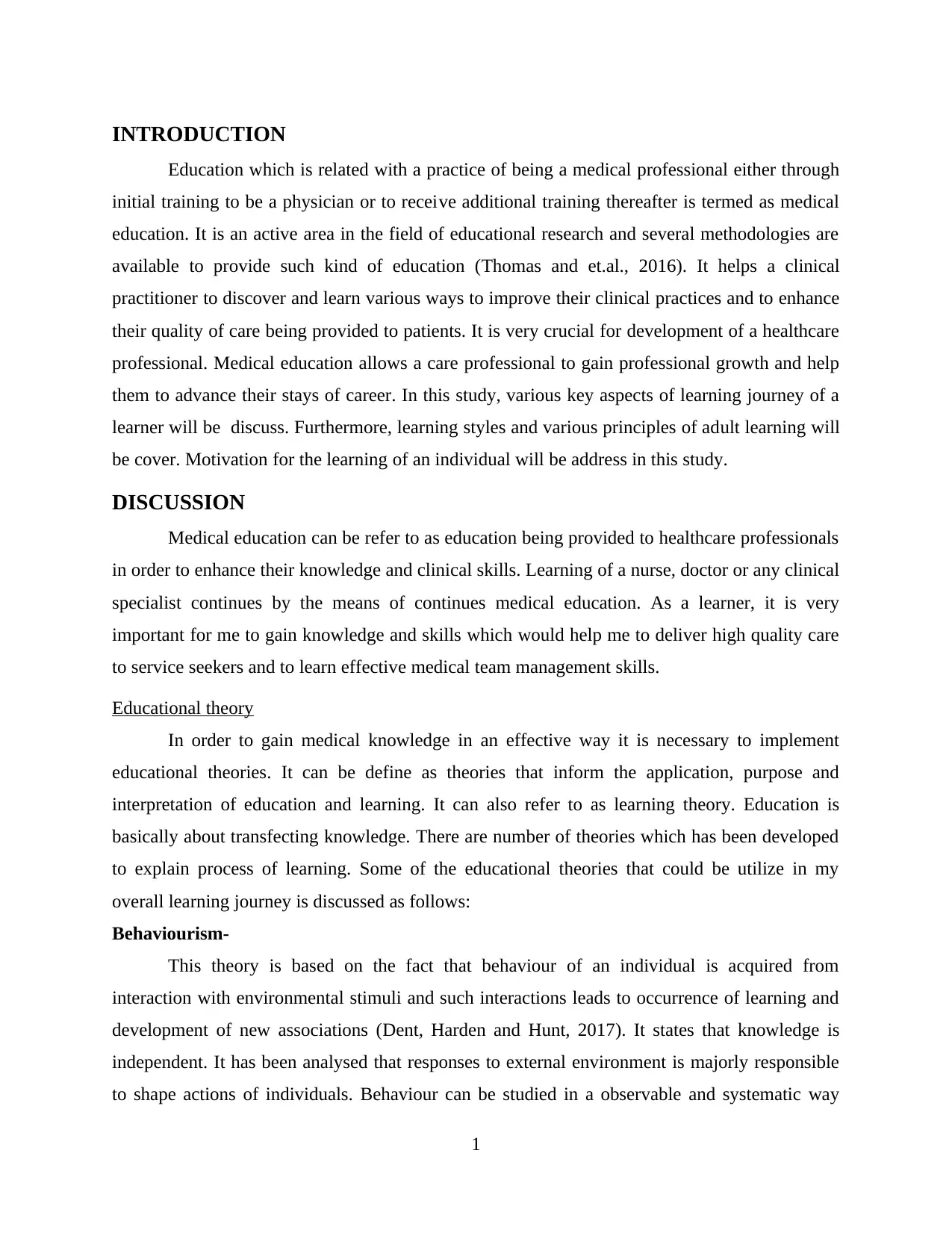
INTRODUCTION
Education which is related with a practice of being a medical professional either through
initial training to be a physician or to receive additional training thereafter is termed as medical
education. It is an active area in the field of educational research and several methodologies are
available to provide such kind of education (Thomas and et.al., 2016). It helps a clinical
practitioner to discover and learn various ways to improve their clinical practices and to enhance
their quality of care being provided to patients. It is very crucial for development of a healthcare
professional. Medical education allows a care professional to gain professional growth and help
them to advance their stays of career. In this study, various key aspects of learning journey of a
learner will be discuss. Furthermore, learning styles and various principles of adult learning will
be cover. Motivation for the learning of an individual will be address in this study.
DISCUSSION
Medical education can be refer to as education being provided to healthcare professionals
in order to enhance their knowledge and clinical skills. Learning of a nurse, doctor or any clinical
specialist continues by the means of continues medical education. As a learner, it is very
important for me to gain knowledge and skills which would help me to deliver high quality care
to service seekers and to learn effective medical team management skills.
Educational theory
In order to gain medical knowledge in an effective way it is necessary to implement
educational theories. It can be define as theories that inform the application, purpose and
interpretation of education and learning. It can also refer to as learning theory. Education is
basically about transfecting knowledge. There are number of theories which has been developed
to explain process of learning. Some of the educational theories that could be utilize in my
overall learning journey is discussed as follows:
Behaviourism-
This theory is based on the fact that behaviour of an individual is acquired from
interaction with environmental stimuli and such interactions leads to occurrence of learning and
development of new associations (Dent, Harden and Hunt, 2017). It states that knowledge is
independent. It has been analysed that responses to external environment is majorly responsible
to shape actions of individuals. Behaviour can be studied in a observable and systematic way
1
Education which is related with a practice of being a medical professional either through
initial training to be a physician or to receive additional training thereafter is termed as medical
education. It is an active area in the field of educational research and several methodologies are
available to provide such kind of education (Thomas and et.al., 2016). It helps a clinical
practitioner to discover and learn various ways to improve their clinical practices and to enhance
their quality of care being provided to patients. It is very crucial for development of a healthcare
professional. Medical education allows a care professional to gain professional growth and help
them to advance their stays of career. In this study, various key aspects of learning journey of a
learner will be discuss. Furthermore, learning styles and various principles of adult learning will
be cover. Motivation for the learning of an individual will be address in this study.
DISCUSSION
Medical education can be refer to as education being provided to healthcare professionals
in order to enhance their knowledge and clinical skills. Learning of a nurse, doctor or any clinical
specialist continues by the means of continues medical education. As a learner, it is very
important for me to gain knowledge and skills which would help me to deliver high quality care
to service seekers and to learn effective medical team management skills.
Educational theory
In order to gain medical knowledge in an effective way it is necessary to implement
educational theories. It can be define as theories that inform the application, purpose and
interpretation of education and learning. It can also refer to as learning theory. Education is
basically about transfecting knowledge. There are number of theories which has been developed
to explain process of learning. Some of the educational theories that could be utilize in my
overall learning journey is discussed as follows:
Behaviourism-
This theory is based on the fact that behaviour of an individual is acquired from
interaction with environmental stimuli and such interactions leads to occurrence of learning and
development of new associations (Dent, Harden and Hunt, 2017). It states that knowledge is
independent. It has been analysed that responses to external environment is majorly responsible
to shape actions of individuals. Behaviour can be studied in a observable and systematic way
1
Paraphrase This Document
Need a fresh take? Get an instant paraphrase of this document with our AI Paraphraser
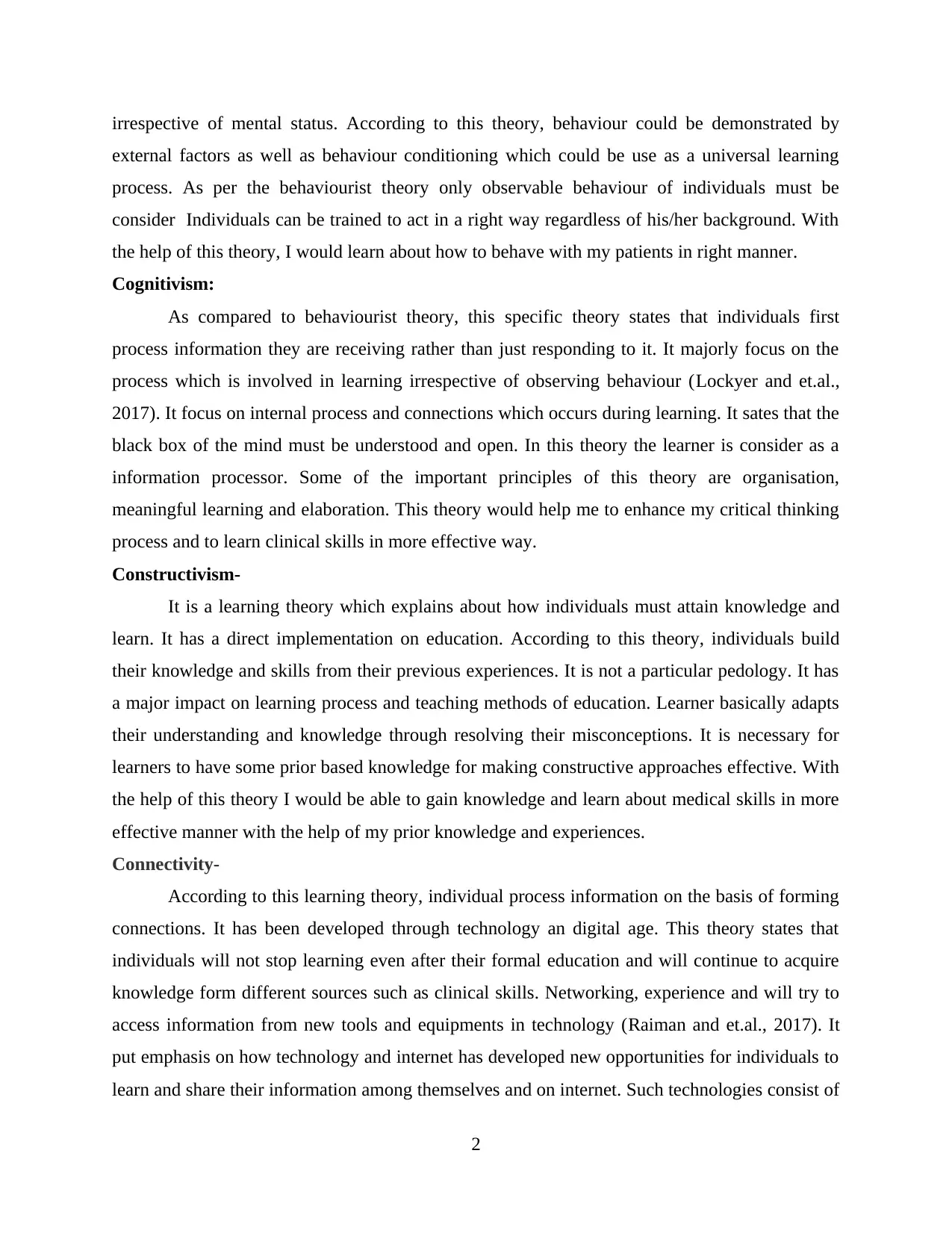
irrespective of mental status. According to this theory, behaviour could be demonstrated by
external factors as well as behaviour conditioning which could be use as a universal learning
process. As per the behaviourist theory only observable behaviour of individuals must be
consider Individuals can be trained to act in a right way regardless of his/her background. With
the help of this theory, I would learn about how to behave with my patients in right manner.
Cognitivism:
As compared to behaviourist theory, this specific theory states that individuals first
process information they are receiving rather than just responding to it. It majorly focus on the
process which is involved in learning irrespective of observing behaviour (Lockyer and et.al.,
2017). It focus on internal process and connections which occurs during learning. It sates that the
black box of the mind must be understood and open. In this theory the learner is consider as a
information processor. Some of the important principles of this theory are organisation,
meaningful learning and elaboration. This theory would help me to enhance my critical thinking
process and to learn clinical skills in more effective way.
Constructivism-
It is a learning theory which explains about how individuals must attain knowledge and
learn. It has a direct implementation on education. According to this theory, individuals build
their knowledge and skills from their previous experiences. It is not a particular pedology. It has
a major impact on learning process and teaching methods of education. Learner basically adapts
their understanding and knowledge through resolving their misconceptions. It is necessary for
learners to have some prior based knowledge for making constructive approaches effective. With
the help of this theory I would be able to gain knowledge and learn about medical skills in more
effective manner with the help of my prior knowledge and experiences.
Connectivity-
According to this learning theory, individual process information on the basis of forming
connections. It has been developed through technology an digital age. This theory states that
individuals will not stop learning even after their formal education and will continue to acquire
knowledge form different sources such as clinical skills. Networking, experience and will try to
access information from new tools and equipments in technology (Raiman and et.al., 2017). It
put emphasis on how technology and internet has developed new opportunities for individuals to
learn and share their information among themselves and on internet. Such technologies consist of
2
external factors as well as behaviour conditioning which could be use as a universal learning
process. As per the behaviourist theory only observable behaviour of individuals must be
consider Individuals can be trained to act in a right way regardless of his/her background. With
the help of this theory, I would learn about how to behave with my patients in right manner.
Cognitivism:
As compared to behaviourist theory, this specific theory states that individuals first
process information they are receiving rather than just responding to it. It majorly focus on the
process which is involved in learning irrespective of observing behaviour (Lockyer and et.al.,
2017). It focus on internal process and connections which occurs during learning. It sates that the
black box of the mind must be understood and open. In this theory the learner is consider as a
information processor. Some of the important principles of this theory are organisation,
meaningful learning and elaboration. This theory would help me to enhance my critical thinking
process and to learn clinical skills in more effective way.
Constructivism-
It is a learning theory which explains about how individuals must attain knowledge and
learn. It has a direct implementation on education. According to this theory, individuals build
their knowledge and skills from their previous experiences. It is not a particular pedology. It has
a major impact on learning process and teaching methods of education. Learner basically adapts
their understanding and knowledge through resolving their misconceptions. It is necessary for
learners to have some prior based knowledge for making constructive approaches effective. With
the help of this theory I would be able to gain knowledge and learn about medical skills in more
effective manner with the help of my prior knowledge and experiences.
Connectivity-
According to this learning theory, individual process information on the basis of forming
connections. It has been developed through technology an digital age. This theory states that
individuals will not stop learning even after their formal education and will continue to acquire
knowledge form different sources such as clinical skills. Networking, experience and will try to
access information from new tools and equipments in technology (Raiman and et.al., 2017). It
put emphasis on how technology and internet has developed new opportunities for individuals to
learn and share their information among themselves and on internet. Such technologies consist of
2
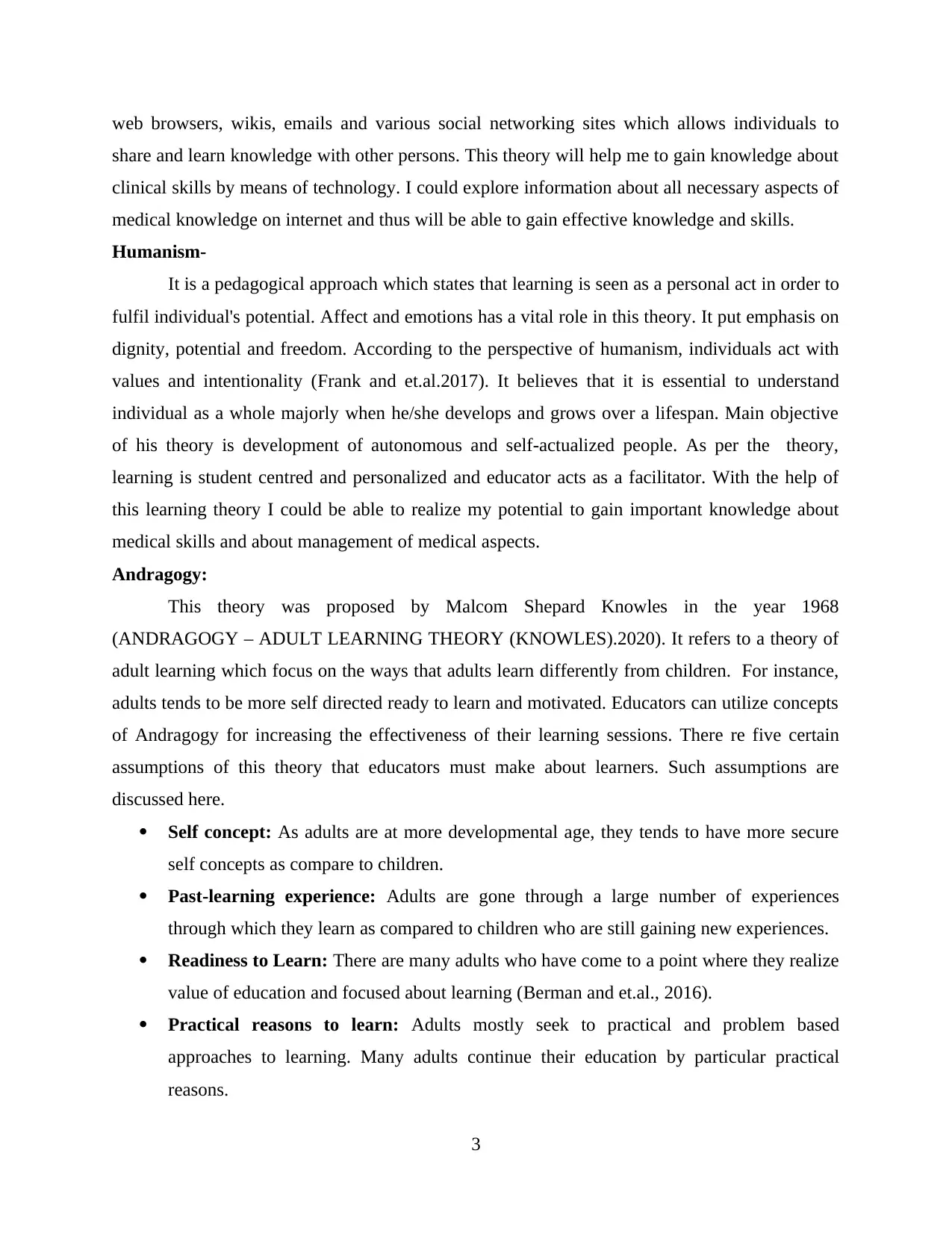
web browsers, wikis, emails and various social networking sites which allows individuals to
share and learn knowledge with other persons. This theory will help me to gain knowledge about
clinical skills by means of technology. I could explore information about all necessary aspects of
medical knowledge on internet and thus will be able to gain effective knowledge and skills.
Humanism-
It is a pedagogical approach which states that learning is seen as a personal act in order to
fulfil individual's potential. Affect and emotions has a vital role in this theory. It put emphasis on
dignity, potential and freedom. According to the perspective of humanism, individuals act with
values and intentionality (Frank and et.al.2017). It believes that it is essential to understand
individual as a whole majorly when he/she develops and grows over a lifespan. Main objective
of his theory is development of autonomous and self-actualized people. As per the theory,
learning is student centred and personalized and educator acts as a facilitator. With the help of
this learning theory I could be able to realize my potential to gain important knowledge about
medical skills and about management of medical aspects.
Andragogy:
This theory was proposed by Malcom Shepard Knowles in the year 1968
(ANDRAGOGY – ADULT LEARNING THEORY (KNOWLES).2020). It refers to a theory of
adult learning which focus on the ways that adults learn differently from children. For instance,
adults tends to be more self directed ready to learn and motivated. Educators can utilize concepts
of Andragogy for increasing the effectiveness of their learning sessions. There re five certain
assumptions of this theory that educators must make about learners. Such assumptions are
discussed here.
Self concept: As adults are at more developmental age, they tends to have more secure
self concepts as compare to children.
Past-learning experience: Adults are gone through a large number of experiences
through which they learn as compared to children who are still gaining new experiences.
Readiness to Learn: There are many adults who have come to a point where they realize
value of education and focused about learning (Berman and et.al., 2016).
Practical reasons to learn: Adults mostly seek to practical and problem based
approaches to learning. Many adults continue their education by particular practical
reasons.
3
share and learn knowledge with other persons. This theory will help me to gain knowledge about
clinical skills by means of technology. I could explore information about all necessary aspects of
medical knowledge on internet and thus will be able to gain effective knowledge and skills.
Humanism-
It is a pedagogical approach which states that learning is seen as a personal act in order to
fulfil individual's potential. Affect and emotions has a vital role in this theory. It put emphasis on
dignity, potential and freedom. According to the perspective of humanism, individuals act with
values and intentionality (Frank and et.al.2017). It believes that it is essential to understand
individual as a whole majorly when he/she develops and grows over a lifespan. Main objective
of his theory is development of autonomous and self-actualized people. As per the theory,
learning is student centred and personalized and educator acts as a facilitator. With the help of
this learning theory I could be able to realize my potential to gain important knowledge about
medical skills and about management of medical aspects.
Andragogy:
This theory was proposed by Malcom Shepard Knowles in the year 1968
(ANDRAGOGY – ADULT LEARNING THEORY (KNOWLES).2020). It refers to a theory of
adult learning which focus on the ways that adults learn differently from children. For instance,
adults tends to be more self directed ready to learn and motivated. Educators can utilize concepts
of Andragogy for increasing the effectiveness of their learning sessions. There re five certain
assumptions of this theory that educators must make about learners. Such assumptions are
discussed here.
Self concept: As adults are at more developmental age, they tends to have more secure
self concepts as compare to children.
Past-learning experience: Adults are gone through a large number of experiences
through which they learn as compared to children who are still gaining new experiences.
Readiness to Learn: There are many adults who have come to a point where they realize
value of education and focused about learning (Berman and et.al., 2016).
Practical reasons to learn: Adults mostly seek to practical and problem based
approaches to learning. Many adults continue their education by particular practical
reasons.
3
⊘ This is a preview!⊘
Do you want full access?
Subscribe today to unlock all pages.

Trusted by 1+ million students worldwide
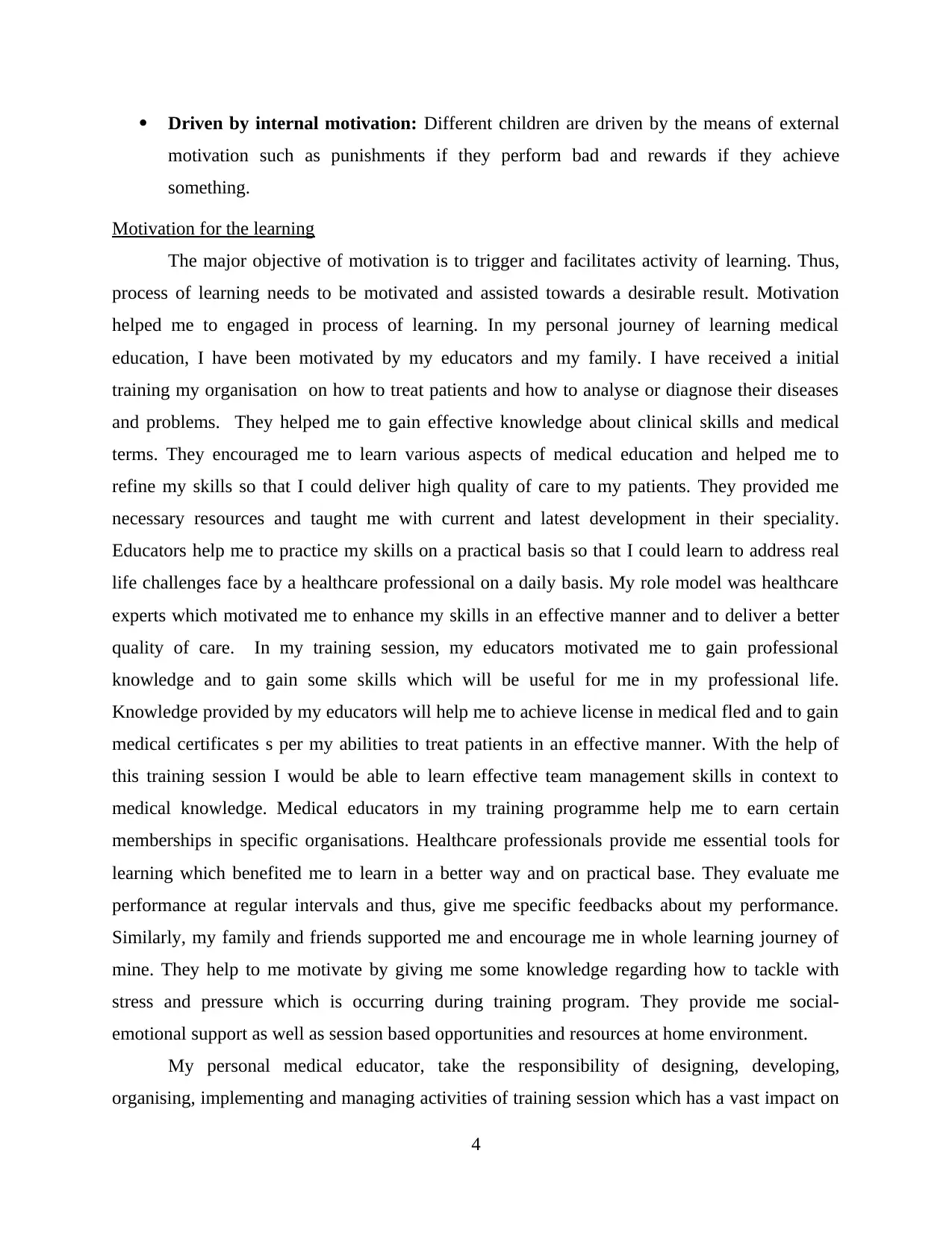
Driven by internal motivation: Different children are driven by the means of external
motivation such as punishments if they perform bad and rewards if they achieve
something.
Motivation for the learning
The major objective of motivation is to trigger and facilitates activity of learning. Thus,
process of learning needs to be motivated and assisted towards a desirable result. Motivation
helped me to engaged in process of learning. In my personal journey of learning medical
education, I have been motivated by my educators and my family. I have received a initial
training my organisation on how to treat patients and how to analyse or diagnose their diseases
and problems. They helped me to gain effective knowledge about clinical skills and medical
terms. They encouraged me to learn various aspects of medical education and helped me to
refine my skills so that I could deliver high quality of care to my patients. They provided me
necessary resources and taught me with current and latest development in their speciality.
Educators help me to practice my skills on a practical basis so that I could learn to address real
life challenges face by a healthcare professional on a daily basis. My role model was healthcare
experts which motivated me to enhance my skills in an effective manner and to deliver a better
quality of care. In my training session, my educators motivated me to gain professional
knowledge and to gain some skills which will be useful for me in my professional life.
Knowledge provided by my educators will help me to achieve license in medical fled and to gain
medical certificates s per my abilities to treat patients in an effective manner. With the help of
this training session I would be able to learn effective team management skills in context to
medical knowledge. Medical educators in my training programme help me to earn certain
memberships in specific organisations. Healthcare professionals provide me essential tools for
learning which benefited me to learn in a better way and on practical base. They evaluate me
performance at regular intervals and thus, give me specific feedbacks about my performance.
Similarly, my family and friends supported me and encourage me in whole learning journey of
mine. They help to me motivate by giving me some knowledge regarding how to tackle with
stress and pressure which is occurring during training program. They provide me social-
emotional support as well as session based opportunities and resources at home environment.
My personal medical educator, take the responsibility of designing, developing,
organising, implementing and managing activities of training session which has a vast impact on
4
motivation such as punishments if they perform bad and rewards if they achieve
something.
Motivation for the learning
The major objective of motivation is to trigger and facilitates activity of learning. Thus,
process of learning needs to be motivated and assisted towards a desirable result. Motivation
helped me to engaged in process of learning. In my personal journey of learning medical
education, I have been motivated by my educators and my family. I have received a initial
training my organisation on how to treat patients and how to analyse or diagnose their diseases
and problems. They helped me to gain effective knowledge about clinical skills and medical
terms. They encouraged me to learn various aspects of medical education and helped me to
refine my skills so that I could deliver high quality of care to my patients. They provided me
necessary resources and taught me with current and latest development in their speciality.
Educators help me to practice my skills on a practical basis so that I could learn to address real
life challenges face by a healthcare professional on a daily basis. My role model was healthcare
experts which motivated me to enhance my skills in an effective manner and to deliver a better
quality of care. In my training session, my educators motivated me to gain professional
knowledge and to gain some skills which will be useful for me in my professional life.
Knowledge provided by my educators will help me to achieve license in medical fled and to gain
medical certificates s per my abilities to treat patients in an effective manner. With the help of
this training session I would be able to learn effective team management skills in context to
medical knowledge. Medical educators in my training programme help me to earn certain
memberships in specific organisations. Healthcare professionals provide me essential tools for
learning which benefited me to learn in a better way and on practical base. They evaluate me
performance at regular intervals and thus, give me specific feedbacks about my performance.
Similarly, my family and friends supported me and encourage me in whole learning journey of
mine. They help to me motivate by giving me some knowledge regarding how to tackle with
stress and pressure which is occurring during training program. They provide me social-
emotional support as well as session based opportunities and resources at home environment.
My personal medical educator, take the responsibility of designing, developing,
organising, implementing and managing activities of training session which has a vast impact on
4
Paraphrase This Document
Need a fresh take? Get an instant paraphrase of this document with our AI Paraphraser
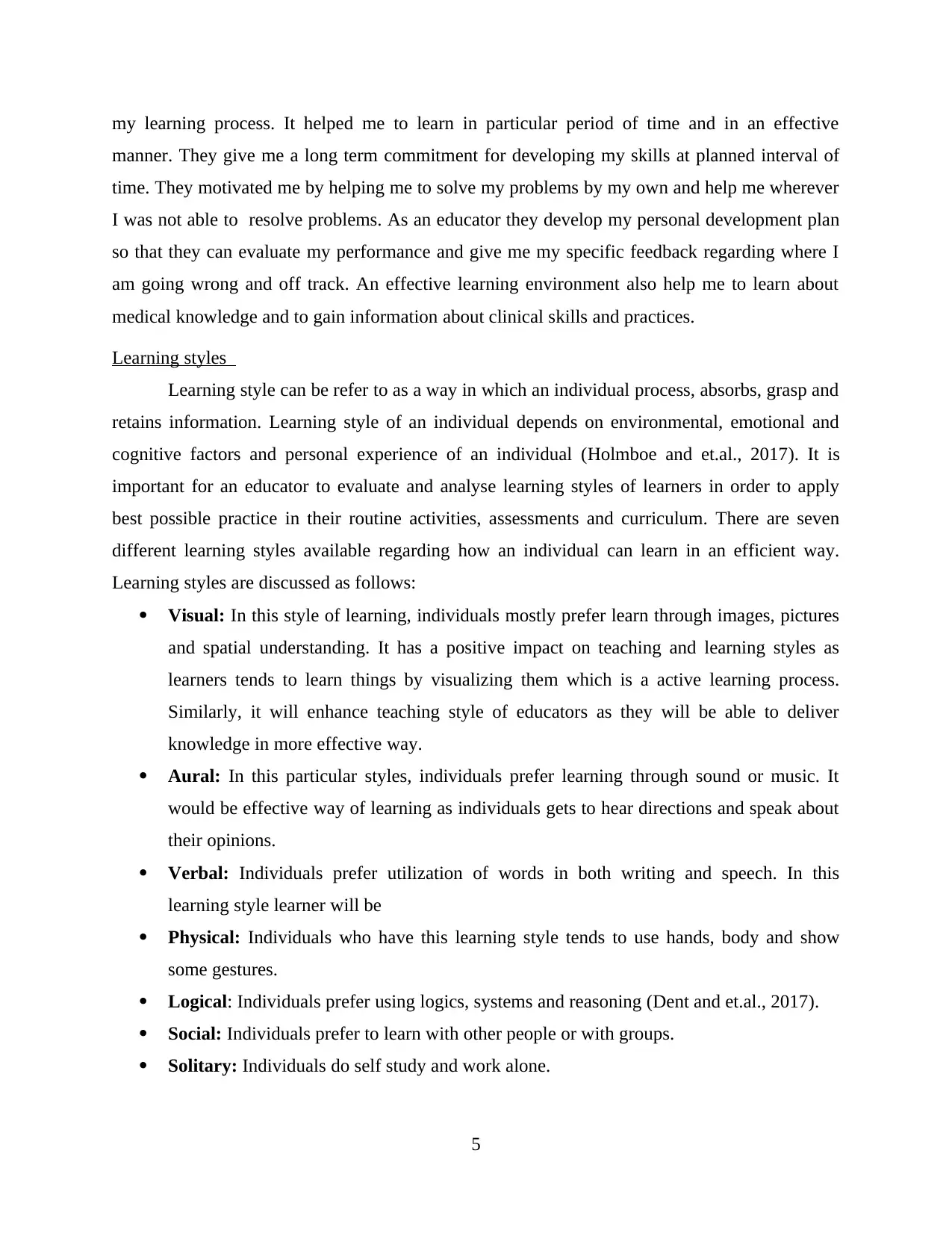
my learning process. It helped me to learn in particular period of time and in an effective
manner. They give me a long term commitment for developing my skills at planned interval of
time. They motivated me by helping me to solve my problems by my own and help me wherever
I was not able to resolve problems. As an educator they develop my personal development plan
so that they can evaluate my performance and give me my specific feedback regarding where I
am going wrong and off track. An effective learning environment also help me to learn about
medical knowledge and to gain information about clinical skills and practices.
Learning styles
Learning style can be refer to as a way in which an individual process, absorbs, grasp and
retains information. Learning style of an individual depends on environmental, emotional and
cognitive factors and personal experience of an individual (Holmboe and et.al., 2017). It is
important for an educator to evaluate and analyse learning styles of learners in order to apply
best possible practice in their routine activities, assessments and curriculum. There are seven
different learning styles available regarding how an individual can learn in an efficient way.
Learning styles are discussed as follows:
Visual: In this style of learning, individuals mostly prefer learn through images, pictures
and spatial understanding. It has a positive impact on teaching and learning styles as
learners tends to learn things by visualizing them which is a active learning process.
Similarly, it will enhance teaching style of educators as they will be able to deliver
knowledge in more effective way.
Aural: In this particular styles, individuals prefer learning through sound or music. It
would be effective way of learning as individuals gets to hear directions and speak about
their opinions.
Verbal: Individuals prefer utilization of words in both writing and speech. In this
learning style learner will be
Physical: Individuals who have this learning style tends to use hands, body and show
some gestures.
Logical: Individuals prefer using logics, systems and reasoning (Dent and et.al., 2017).
Social: Individuals prefer to learn with other people or with groups.
Solitary: Individuals do self study and work alone.
5
manner. They give me a long term commitment for developing my skills at planned interval of
time. They motivated me by helping me to solve my problems by my own and help me wherever
I was not able to resolve problems. As an educator they develop my personal development plan
so that they can evaluate my performance and give me my specific feedback regarding where I
am going wrong and off track. An effective learning environment also help me to learn about
medical knowledge and to gain information about clinical skills and practices.
Learning styles
Learning style can be refer to as a way in which an individual process, absorbs, grasp and
retains information. Learning style of an individual depends on environmental, emotional and
cognitive factors and personal experience of an individual (Holmboe and et.al., 2017). It is
important for an educator to evaluate and analyse learning styles of learners in order to apply
best possible practice in their routine activities, assessments and curriculum. There are seven
different learning styles available regarding how an individual can learn in an efficient way.
Learning styles are discussed as follows:
Visual: In this style of learning, individuals mostly prefer learn through images, pictures
and spatial understanding. It has a positive impact on teaching and learning styles as
learners tends to learn things by visualizing them which is a active learning process.
Similarly, it will enhance teaching style of educators as they will be able to deliver
knowledge in more effective way.
Aural: In this particular styles, individuals prefer learning through sound or music. It
would be effective way of learning as individuals gets to hear directions and speak about
their opinions.
Verbal: Individuals prefer utilization of words in both writing and speech. In this
learning style learner will be
Physical: Individuals who have this learning style tends to use hands, body and show
some gestures.
Logical: Individuals prefer using logics, systems and reasoning (Dent and et.al., 2017).
Social: Individuals prefer to learn with other people or with groups.
Solitary: Individuals do self study and work alone.
5
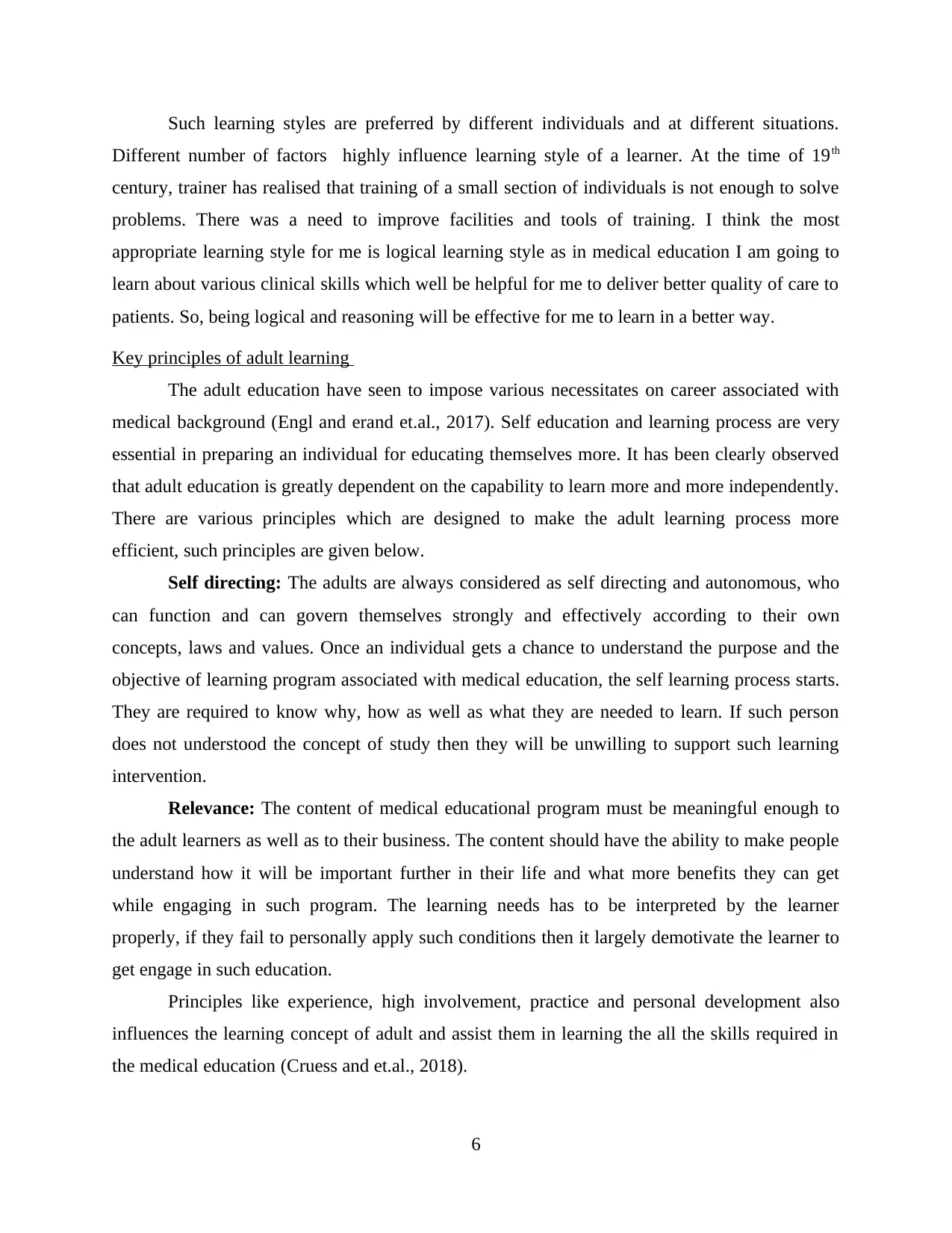
Such learning styles are preferred by different individuals and at different situations.
Different number of factors highly influence learning style of a learner. At the time of 19th
century, trainer has realised that training of a small section of individuals is not enough to solve
problems. There was a need to improve facilities and tools of training. I think the most
appropriate learning style for me is logical learning style as in medical education I am going to
learn about various clinical skills which well be helpful for me to deliver better quality of care to
patients. So, being logical and reasoning will be effective for me to learn in a better way.
Key principles of adult learning
The adult education have seen to impose various necessitates on career associated with
medical background (Engl and erand et.al., 2017). Self education and learning process are very
essential in preparing an individual for educating themselves more. It has been clearly observed
that adult education is greatly dependent on the capability to learn more and more independently.
There are various principles which are designed to make the adult learning process more
efficient, such principles are given below.
Self directing: The adults are always considered as self directing and autonomous, who
can function and can govern themselves strongly and effectively according to their own
concepts, laws and values. Once an individual gets a chance to understand the purpose and the
objective of learning program associated with medical education, the self learning process starts.
They are required to know why, how as well as what they are needed to learn. If such person
does not understood the concept of study then they will be unwilling to support such learning
intervention.
Relevance: The content of medical educational program must be meaningful enough to
the adult learners as well as to their business. The content should have the ability to make people
understand how it will be important further in their life and what more benefits they can get
while engaging in such program. The learning needs has to be interpreted by the learner
properly, if they fail to personally apply such conditions then it largely demotivate the learner to
get engage in such education.
Principles like experience, high involvement, practice and personal development also
influences the learning concept of adult and assist them in learning the all the skills required in
the medical education (Cruess and et.al., 2018).
6
Different number of factors highly influence learning style of a learner. At the time of 19th
century, trainer has realised that training of a small section of individuals is not enough to solve
problems. There was a need to improve facilities and tools of training. I think the most
appropriate learning style for me is logical learning style as in medical education I am going to
learn about various clinical skills which well be helpful for me to deliver better quality of care to
patients. So, being logical and reasoning will be effective for me to learn in a better way.
Key principles of adult learning
The adult education have seen to impose various necessitates on career associated with
medical background (Engl and erand et.al., 2017). Self education and learning process are very
essential in preparing an individual for educating themselves more. It has been clearly observed
that adult education is greatly dependent on the capability to learn more and more independently.
There are various principles which are designed to make the adult learning process more
efficient, such principles are given below.
Self directing: The adults are always considered as self directing and autonomous, who
can function and can govern themselves strongly and effectively according to their own
concepts, laws and values. Once an individual gets a chance to understand the purpose and the
objective of learning program associated with medical education, the self learning process starts.
They are required to know why, how as well as what they are needed to learn. If such person
does not understood the concept of study then they will be unwilling to support such learning
intervention.
Relevance: The content of medical educational program must be meaningful enough to
the adult learners as well as to their business. The content should have the ability to make people
understand how it will be important further in their life and what more benefits they can get
while engaging in such program. The learning needs has to be interpreted by the learner
properly, if they fail to personally apply such conditions then it largely demotivate the learner to
get engage in such education.
Principles like experience, high involvement, practice and personal development also
influences the learning concept of adult and assist them in learning the all the skills required in
the medical education (Cruess and et.al., 2018).
6
⊘ This is a preview!⊘
Do you want full access?
Subscribe today to unlock all pages.

Trusted by 1+ million students worldwide
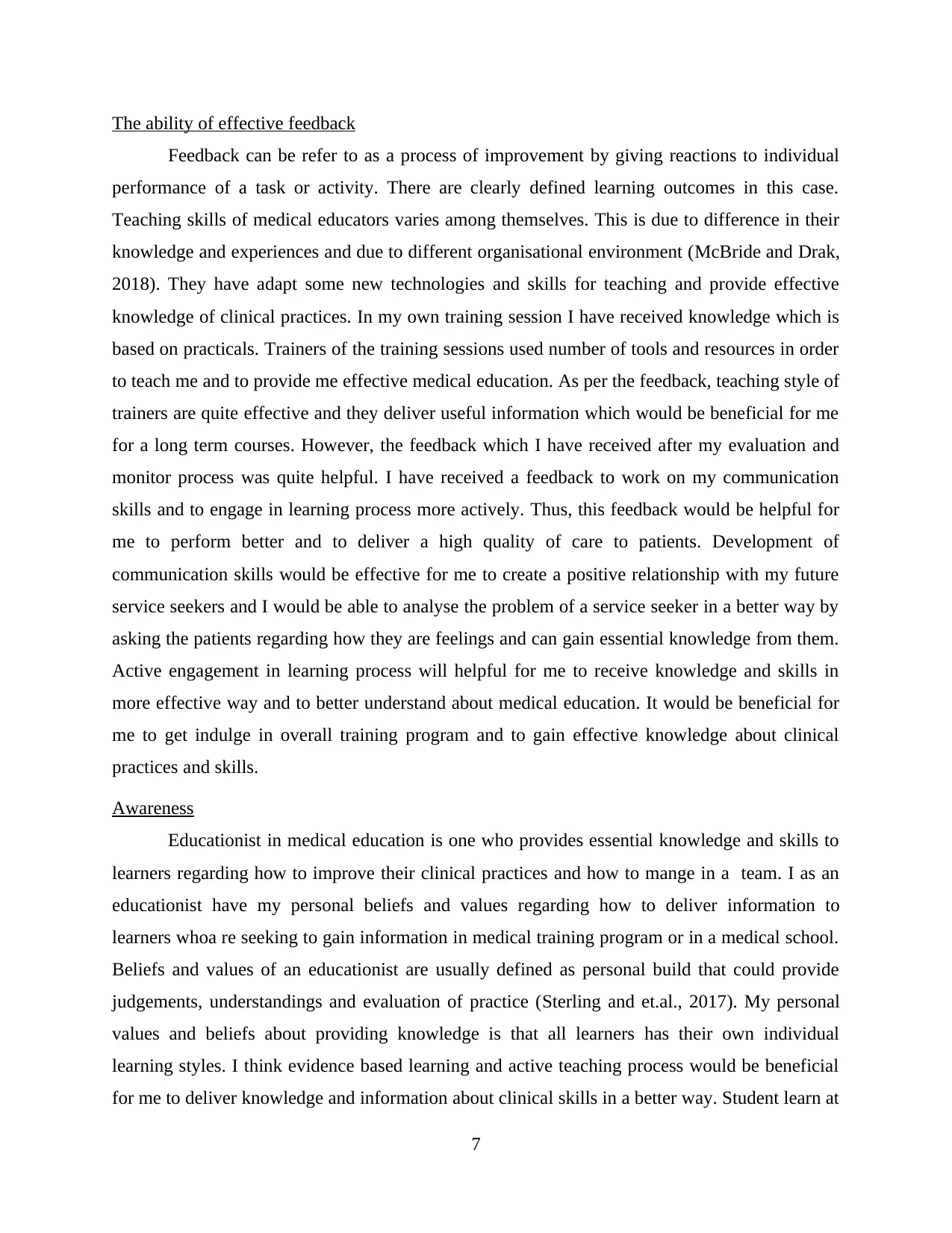
The ability of effective feedback
Feedback can be refer to as a process of improvement by giving reactions to individual
performance of a task or activity. There are clearly defined learning outcomes in this case.
Teaching skills of medical educators varies among themselves. This is due to difference in their
knowledge and experiences and due to different organisational environment (McBride and Drak,
2018). They have adapt some new technologies and skills for teaching and provide effective
knowledge of clinical practices. In my own training session I have received knowledge which is
based on practicals. Trainers of the training sessions used number of tools and resources in order
to teach me and to provide me effective medical education. As per the feedback, teaching style of
trainers are quite effective and they deliver useful information which would be beneficial for me
for a long term courses. However, the feedback which I have received after my evaluation and
monitor process was quite helpful. I have received a feedback to work on my communication
skills and to engage in learning process more actively. Thus, this feedback would be helpful for
me to perform better and to deliver a high quality of care to patients. Development of
communication skills would be effective for me to create a positive relationship with my future
service seekers and I would be able to analyse the problem of a service seeker in a better way by
asking the patients regarding how they are feelings and can gain essential knowledge from them.
Active engagement in learning process will helpful for me to receive knowledge and skills in
more effective way and to better understand about medical education. It would be beneficial for
me to get indulge in overall training program and to gain effective knowledge about clinical
practices and skills.
Awareness
Educationist in medical education is one who provides essential knowledge and skills to
learners regarding how to improve their clinical practices and how to mange in a team. I as an
educationist have my personal beliefs and values regarding how to deliver information to
learners whoa re seeking to gain information in medical training program or in a medical school.
Beliefs and values of an educationist are usually defined as personal build that could provide
judgements, understandings and evaluation of practice (Sterling and et.al., 2017). My personal
values and beliefs about providing knowledge is that all learners has their own individual
learning styles. I think evidence based learning and active teaching process would be beneficial
for me to deliver knowledge and information about clinical skills in a better way. Student learn at
7
Feedback can be refer to as a process of improvement by giving reactions to individual
performance of a task or activity. There are clearly defined learning outcomes in this case.
Teaching skills of medical educators varies among themselves. This is due to difference in their
knowledge and experiences and due to different organisational environment (McBride and Drak,
2018). They have adapt some new technologies and skills for teaching and provide effective
knowledge of clinical practices. In my own training session I have received knowledge which is
based on practicals. Trainers of the training sessions used number of tools and resources in order
to teach me and to provide me effective medical education. As per the feedback, teaching style of
trainers are quite effective and they deliver useful information which would be beneficial for me
for a long term courses. However, the feedback which I have received after my evaluation and
monitor process was quite helpful. I have received a feedback to work on my communication
skills and to engage in learning process more actively. Thus, this feedback would be helpful for
me to perform better and to deliver a high quality of care to patients. Development of
communication skills would be effective for me to create a positive relationship with my future
service seekers and I would be able to analyse the problem of a service seeker in a better way by
asking the patients regarding how they are feelings and can gain essential knowledge from them.
Active engagement in learning process will helpful for me to receive knowledge and skills in
more effective way and to better understand about medical education. It would be beneficial for
me to get indulge in overall training program and to gain effective knowledge about clinical
practices and skills.
Awareness
Educationist in medical education is one who provides essential knowledge and skills to
learners regarding how to improve their clinical practices and how to mange in a team. I as an
educationist have my personal beliefs and values regarding how to deliver information to
learners whoa re seeking to gain information in medical training program or in a medical school.
Beliefs and values of an educationist are usually defined as personal build that could provide
judgements, understandings and evaluation of practice (Sterling and et.al., 2017). My personal
values and beliefs about providing knowledge is that all learners has their own individual
learning styles. I think evidence based learning and active teaching process would be beneficial
for me to deliver knowledge and information about clinical skills in a better way. Student learn at
7
Paraphrase This Document
Need a fresh take? Get an instant paraphrase of this document with our AI Paraphraser
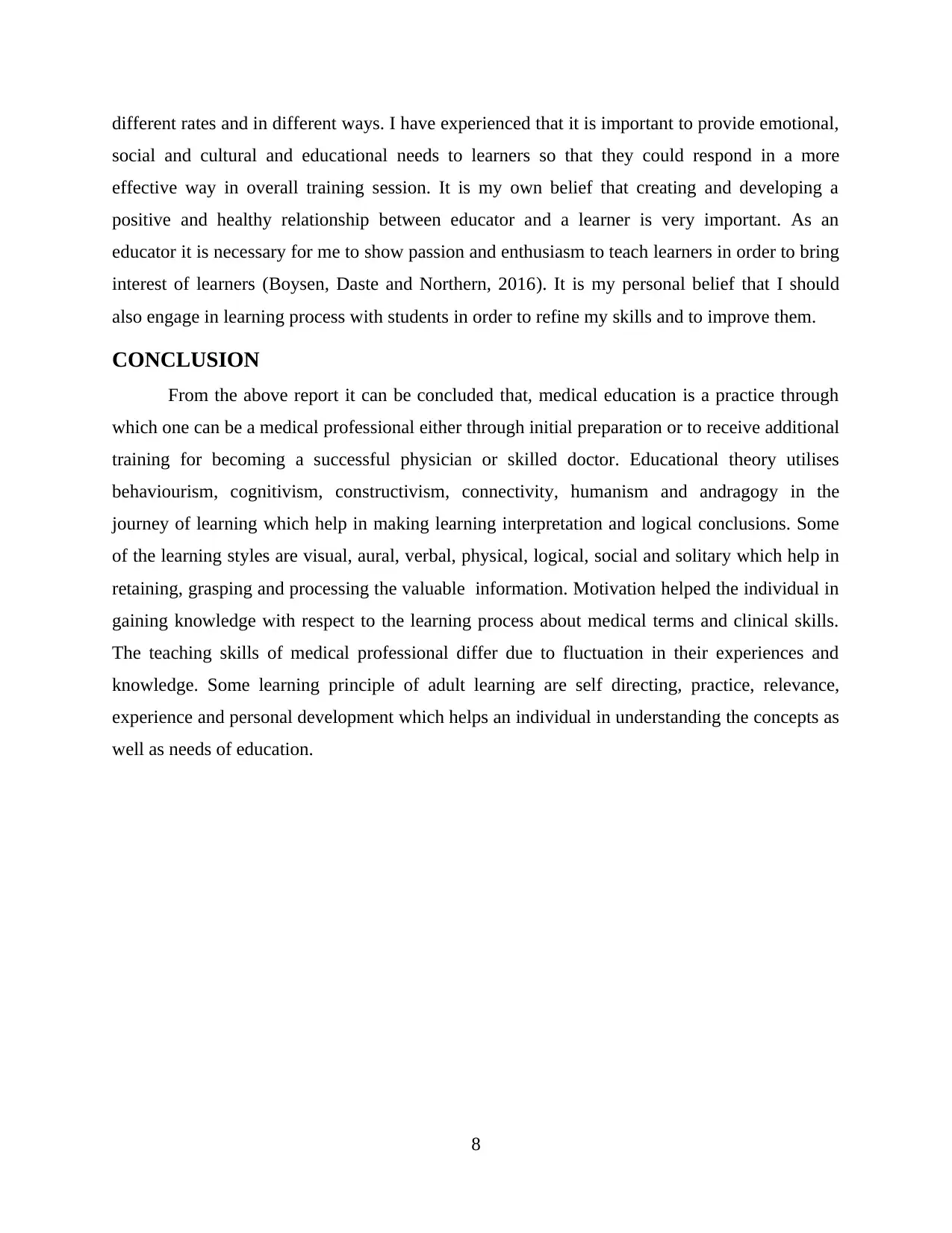
different rates and in different ways. I have experienced that it is important to provide emotional,
social and cultural and educational needs to learners so that they could respond in a more
effective way in overall training session. It is my own belief that creating and developing a
positive and healthy relationship between educator and a learner is very important. As an
educator it is necessary for me to show passion and enthusiasm to teach learners in order to bring
interest of learners (Boysen, Daste and Northern, 2016). It is my personal belief that I should
also engage in learning process with students in order to refine my skills and to improve them.
CONCLUSION
From the above report it can be concluded that, medical education is a practice through
which one can be a medical professional either through initial preparation or to receive additional
training for becoming a successful physician or skilled doctor. Educational theory utilises
behaviourism, cognitivism, constructivism, connectivity, humanism and andragogy in the
journey of learning which help in making learning interpretation and logical conclusions. Some
of the learning styles are visual, aural, verbal, physical, logical, social and solitary which help in
retaining, grasping and processing the valuable information. Motivation helped the individual in
gaining knowledge with respect to the learning process about medical terms and clinical skills.
The teaching skills of medical professional differ due to fluctuation in their experiences and
knowledge. Some learning principle of adult learning are self directing, practice, relevance,
experience and personal development which helps an individual in understanding the concepts as
well as needs of education.
8
social and cultural and educational needs to learners so that they could respond in a more
effective way in overall training session. It is my own belief that creating and developing a
positive and healthy relationship between educator and a learner is very important. As an
educator it is necessary for me to show passion and enthusiasm to teach learners in order to bring
interest of learners (Boysen, Daste and Northern, 2016). It is my personal belief that I should
also engage in learning process with students in order to refine my skills and to improve them.
CONCLUSION
From the above report it can be concluded that, medical education is a practice through
which one can be a medical professional either through initial preparation or to receive additional
training for becoming a successful physician or skilled doctor. Educational theory utilises
behaviourism, cognitivism, constructivism, connectivity, humanism and andragogy in the
journey of learning which help in making learning interpretation and logical conclusions. Some
of the learning styles are visual, aural, verbal, physical, logical, social and solitary which help in
retaining, grasping and processing the valuable information. Motivation helped the individual in
gaining knowledge with respect to the learning process about medical terms and clinical skills.
The teaching skills of medical professional differ due to fluctuation in their experiences and
knowledge. Some learning principle of adult learning are self directing, practice, relevance,
experience and personal development which helps an individual in understanding the concepts as
well as needs of education.
8
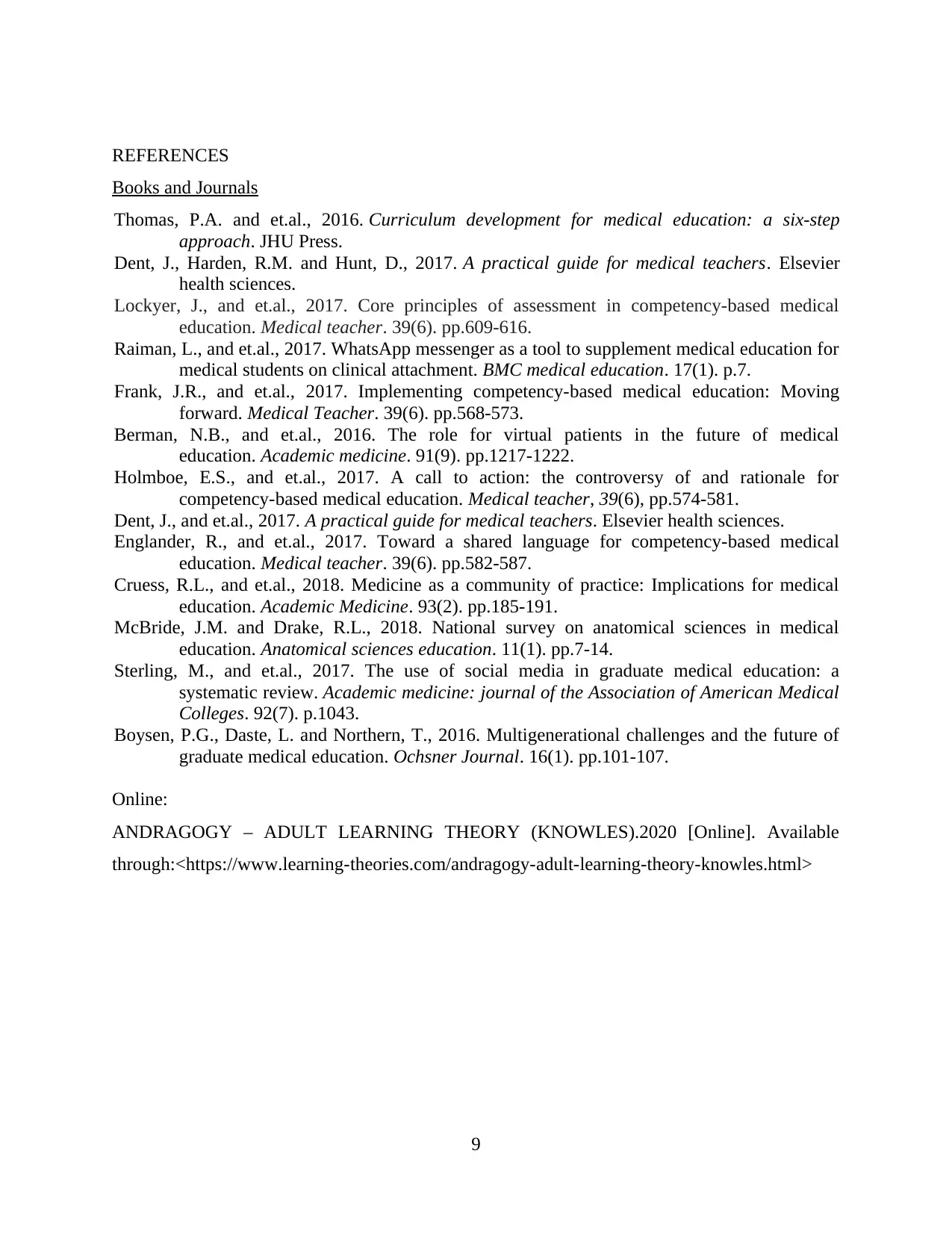
REFERENCES
Books and Journals
Thomas, P.A. and et.al., 2016. Curriculum development for medical education: a six-step
approach. JHU Press.
Dent, J., Harden, R.M. and Hunt, D., 2017. A practical guide for medical teachers. Elsevier
health sciences.
Lockyer, J., and et.al., 2017. Core principles of assessment in competency-based medical
education. Medical teacher. 39(6). pp.609-616.
Raiman, L., and et.al., 2017. WhatsApp messenger as a tool to supplement medical education for
medical students on clinical attachment. BMC medical education. 17(1). p.7.
Frank, J.R., and et.al., 2017. Implementing competency-based medical education: Moving
forward. Medical Teacher. 39(6). pp.568-573.
Berman, N.B., and et.al., 2016. The role for virtual patients in the future of medical
education. Academic medicine. 91(9). pp.1217-1222.
Holmboe, E.S., and et.al., 2017. A call to action: the controversy of and rationale for
competency-based medical education. Medical teacher, 39(6), pp.574-581.
Dent, J., and et.al., 2017. A practical guide for medical teachers. Elsevier health sciences.
Englander, R., and et.al., 2017. Toward a shared language for competency-based medical
education. Medical teacher. 39(6). pp.582-587.
Cruess, R.L., and et.al., 2018. Medicine as a community of practice: Implications for medical
education. Academic Medicine. 93(2). pp.185-191.
McBride, J.M. and Drake, R.L., 2018. National survey on anatomical sciences in medical
education. Anatomical sciences education. 11(1). pp.7-14.
Sterling, M., and et.al., 2017. The use of social media in graduate medical education: a
systematic review. Academic medicine: journal of the Association of American Medical
Colleges. 92(7). p.1043.
Boysen, P.G., Daste, L. and Northern, T., 2016. Multigenerational challenges and the future of
graduate medical education. Ochsner Journal. 16(1). pp.101-107.
Online:
ANDRAGOGY – ADULT LEARNING THEORY (KNOWLES).2020 [Online]. Available
through:<https://www.learning-theories.com/andragogy-adult-learning-theory-knowles.html>
9
Books and Journals
Thomas, P.A. and et.al., 2016. Curriculum development for medical education: a six-step
approach. JHU Press.
Dent, J., Harden, R.M. and Hunt, D., 2017. A practical guide for medical teachers. Elsevier
health sciences.
Lockyer, J., and et.al., 2017. Core principles of assessment in competency-based medical
education. Medical teacher. 39(6). pp.609-616.
Raiman, L., and et.al., 2017. WhatsApp messenger as a tool to supplement medical education for
medical students on clinical attachment. BMC medical education. 17(1). p.7.
Frank, J.R., and et.al., 2017. Implementing competency-based medical education: Moving
forward. Medical Teacher. 39(6). pp.568-573.
Berman, N.B., and et.al., 2016. The role for virtual patients in the future of medical
education. Academic medicine. 91(9). pp.1217-1222.
Holmboe, E.S., and et.al., 2017. A call to action: the controversy of and rationale for
competency-based medical education. Medical teacher, 39(6), pp.574-581.
Dent, J., and et.al., 2017. A practical guide for medical teachers. Elsevier health sciences.
Englander, R., and et.al., 2017. Toward a shared language for competency-based medical
education. Medical teacher. 39(6). pp.582-587.
Cruess, R.L., and et.al., 2018. Medicine as a community of practice: Implications for medical
education. Academic Medicine. 93(2). pp.185-191.
McBride, J.M. and Drake, R.L., 2018. National survey on anatomical sciences in medical
education. Anatomical sciences education. 11(1). pp.7-14.
Sterling, M., and et.al., 2017. The use of social media in graduate medical education: a
systematic review. Academic medicine: journal of the Association of American Medical
Colleges. 92(7). p.1043.
Boysen, P.G., Daste, L. and Northern, T., 2016. Multigenerational challenges and the future of
graduate medical education. Ochsner Journal. 16(1). pp.101-107.
Online:
ANDRAGOGY – ADULT LEARNING THEORY (KNOWLES).2020 [Online]. Available
through:<https://www.learning-theories.com/andragogy-adult-learning-theory-knowles.html>
9
⊘ This is a preview!⊘
Do you want full access?
Subscribe today to unlock all pages.

Trusted by 1+ million students worldwide
1 out of 12
Related Documents
Your All-in-One AI-Powered Toolkit for Academic Success.
+13062052269
info@desklib.com
Available 24*7 on WhatsApp / Email
![[object Object]](/_next/static/media/star-bottom.7253800d.svg)
Unlock your academic potential
Copyright © 2020–2026 A2Z Services. All Rights Reserved. Developed and managed by ZUCOL.




